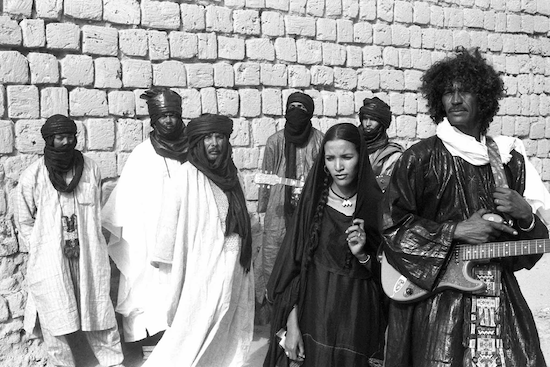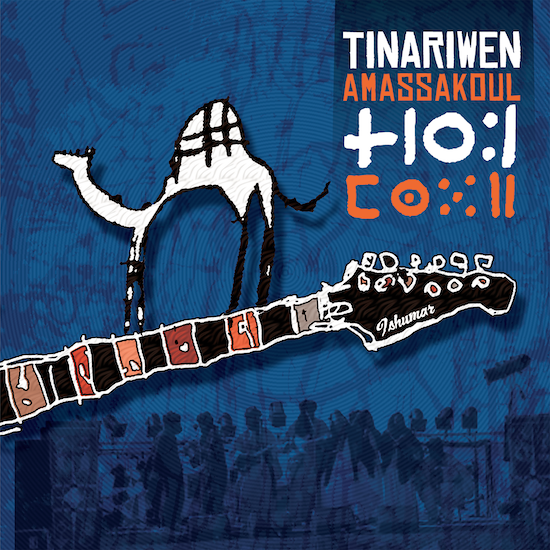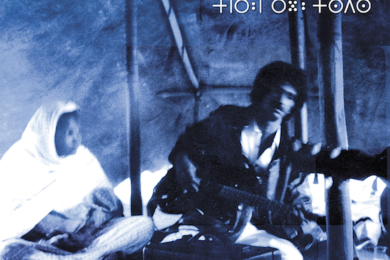Tinariwen are a band, if that’s even the right word to describe such a loosely aligned and changing collective, that fascinate other musicians. Choosing his Desert Island Discs recently, for example, Robert Plant recalled travelling to Mali for the Festival au Désert in 2003. "You cannot imagine how that felt," <a href="https://www.tinariwen.com/About
Festival of the desert: http://www.festival-au-desert.org" target="out">he said of fetching up in the Sahara outside Timbuktu, an experience clearly still vivid. Among those playing at the event were the "magnificent" Tinariwen, of whom the former Led Zeppelin singer has previously said: "I felt this was the music I’d been looking for all my life."
Over the past two decades, international audiences have come to share Plant’s fascination. One reason for this is straightforward: Tinariwen’s take on the desert blues, rooted in dispossession, rebellion and conflict, with the yearning of the Tuareg people to live nomadically in their ancestral lands, is as authentic as contemporary music gets. Authentic there, incidentally, comes categorically without any air quotes.
Yet for all its direct emotional punch, Tinariwen’s music has never been remotely straightforward. Rather, as proved by these handsomely repackaged and remastered reissues of the band’s first two albums, The Radio Tisdas Sessions (2001) and Amassakoul (2004), this is music that’s deft and supple, built on interweaving parts that push and pull at each other, and which swirl around you like dancing dust devils.
Indeed, you could argue the term desert blues does Tinariwen a disservice in that it equates the band’s music with the 12-bar blues. Of course, there are clear connections, but it’s a misleading simplification to describe music that mixes Arabic sounds with pop; rock & roll with traditional music, and much more besides.
Without dwelling too long on a history related at length in the sleevenotes of The Radio Tisdas Sessions, the band’s website and elsewhere on this site, much of the complexity in Tinariwen’s music is, you would think, rooted in the band’s long pre-Radio Tisdas history. It’s a band biography so convoluted and unlikely that, even cribbed in précis form from these sources, it seems miraculous Tinariwen’s music ever escaped the Sahara at all.
The odyssey of Ibrahim Ag Alhabib lies at the centre of this story. In 1963, when Ibrahim was four, the Malian army murdered his father during an uprising against the government. Growing up in a refugee camp, he saw a guitar in a Western shown at a ramshackle cinema. Fascinated, he built an approximation of the instrument from a tin can, a stick and bicycle brake wire, and taught himself to play.
Even at the age of nine, Ibrahim couldn’t settle. Nicknamed Abaraybone – ‘ragamuffin child’ – he began a wanderer’s existence in Algeria and Libya. It wasn’t until 1979 that Ibrahim took possession of his first acoustic guitar. This was also the period when he first began performing with Alhassane Ag Touhami (‘Hassan’) and brothers Inteyeden Ag Ableline and Liya Ag Ablil (‘Diarra’). Named by their audience, they became Key Tinariwen,’The Desert Boys’.
In 1980, the band answered a call from Libya’s leader, Muammar al-Gaddafi, who wanted to create a regiment of Tuareg fighters, to undertake military training. In 1985, Tinariwen headed for a camp near Tripoli run by the MPA, or Mouvement Populaire de l’Azawad, a Tuareg group campaigning for a new independent state. Tinariwen’s music, initially shared via cassettes, became synonymous with Tuareg aspirations to live in an independent state. Other musicians congregated around the band. In 1990, members of Tinariwen joined an armed rebellion against the Malian government, officially ended by the signing of Tamanrasset Accords in 1991, although conflict rumbled on. Tinariwen turned their attention to music on a full-time basis. As the 1990s progressed, their audience grew.

Tinariwen by Eric Mullet
The Radio Tisdas Sessions marks both the end of this era in the band’s story and a new beginning. In 1998, the French band, Lo’Jo, whose music mixes gypsy, folk and North African influences, encountered Tinariwen at a festival in Mali’s capital, Bamako. In 1999, as a result of this connection and the efforts of Lo’Jo’s manager, Philippe Brix, three members of Tinariwen travelled to a French festival to perform under the name Azawad, named for a future Tuareg state.
In late 1999 and early 2000, Tinariwen convened at the radio station in Kidal, northern Mali. According to the sleevenotes for Radio Tisdas, musicians passing through regularly record sessions at the station, named for the Tamsheq word for ropes that secure a tent, a way to express the station’s role in letting scattered Tuareg camps share information and news.
Technically, it was a difficult place to record. The station was missing four of its eight solar panels and noise considerations scuppered a plan to use a generator. The LP had to be recorded in the evenings, the only time electrical power was available in the town. The recordings were overseen by Lo’Jo, producer and guitarist Justin Adams, and the sound engineer Jean-Paul Romann.
Adams – who has collaborated down the years with the likes of Jah Wobble and Robert Plant – brought two electric guitars, a Fender and a Gibson, which the musicians borrowed in addition to using their own instruments. The emphasis was on catching the sound of Tinariwen as it then was, and this is the favourite LP of several band members, feeling that it captures their ‘real’ sound. The LP was later mixed and mastered in Bath.
In comparison to later Tinariwen recordings, it’s sparse and stark, although there are moments – notably the reverb-heavy opening few bars of ‘Zin Es Gourmeden’ – that already suggest how the band’s sound will develop. ‘Tin-Essako’, recorded live at the first Festival Au Désert in 2001 and faded out, hints tantalisingly at what it must have been like to see Tinariwen live at this time.
Listening to the LP, The Rolling Stones come to mind, not sonically but because of the idea that they have spent their working lives, to a greater or lesser extent, out on manoeuvres from the blues. Every so often, drawn by who knows what instinct, the Stones return to 12-bar base camp to reorientate themselves.
Tinariwen, you would guess, operate in a similar manner. In the two decades since Radio Tisdas, the band have become an international concern and collaborated with artists such as the late Mark Lanegan. Inevitably, Tinariwen’s sound has evolved in response to these experiences, but the music captured on Radio Tisdas represents in some sense the essence of Tinariwen.
Which isn’t to say it’s necessarily better than the albums that have followed. Quoted in the sleevenotes to Radio Tisdas, Justin Adams recalls how he once advised the band to toughen up their rhythm section in order to reach international audiences. "They understood immediately," he says. "They’re profoundly intelligent people and they want the world to hear them."
It’s unclear when Adams imparted this advice, but to judge by second album Amassakoul (‘The Traveller’), it may not have been wholly needed. Compared to Radio Tisdas, Amassakoul is brighter and crisper, if less heavy than later records. Initially, and I write this as someone working through these records for the first time, trying to sort out my thoughts about both the albums and Tinariwen, it sounded like a stronger album, but after a couple of days I found myself returning to Radio Tisdas more often.
To judge by the sleevenotes, fewer stories surround Amassakoul‘s recording – in truth, a little more information here in the packaging would have been helpful – and maybe one reason the album doesn’t linger so long in the imagination is that it catches Tinariwen in transition. New musicians appear, some of the tracks feature flute prominently, ‘Assoul’ is a didjeridoo-enhanced exercise in drone.
What it does share with its predecessor – and without suggesting Tinariwen aren’t capable of conjuring up pastoral and domestic images – is the sense of an album suffused with righteous anger. This sometimes manifests itself in guitars appearing to jump into life, as on the (American) bluesy ‘Chatma’. It’s music to back up lyrics that, translated for the sleeve, tell of hard times, as Ibrahim relates how:
"The fire has been burning for far too long
In our lost slumbers
For the burnt animals and the aged dead"
Here is imagery that calls up the conflicts endured by the Tuareg – and also perhaps the drought that afflicted west Africa in the early 1970s. If there’s ever a temptation to think of Tinariwen’s progress through the years as a conventional career, it’s a reminder of the limitations of this view of the band.

Mali remains a troubled place. The military took over the running of the country in 2020. In 2021, there was another coup d’état. On 10 January 2022, the military junta announced it was closing borders with neighbours after nations in the Economic Community of West African States (ECOWAS) imposed sanctions. Listening to Tinariwen against such a backdrop is to be reminded how, in so many ways, so little has changed. Many of the reasons for Tinariwen’s anger remain unresolved, even ignored.
At a time when Russian artillery is pulverising Ukrainian cities, Tinariwen’s music, its sense of loss, speaks not just to Mali. Siege warfare has returned to Europe. At such a time, I doubt if I’m alone in seeking out music with emotional heft and Tinariwen’s albums connect.
But there’s something else. Tinariwen’s music always stretches out, metaphorically trying to cross the vast spaces of the Sahara, striving to disappear over the horizon. It may seem an odd jump to make, but listening to Tinariwen, I suddenly found myself thinking of the motorik beat of krautrock, and the way that, as a young man who had hardly travelled, I built an idealised Europe partly out of music that, similarly, seemed to stretch out, to invoke a sense of space so lacking in the cramped confines of England. "Fun, fun, fun on the autobahn," as Kraftwerk sadly didn’t say, but really should have done.
Viewing pictures of bombed-out cities and refugees fleeing the war is to see this vision of Europe being ripped apart by those intent on drawing new lines on the map. Tinariwen’s music seems wholly appropriate to the moment precisely because it resists the imposition of borders.



